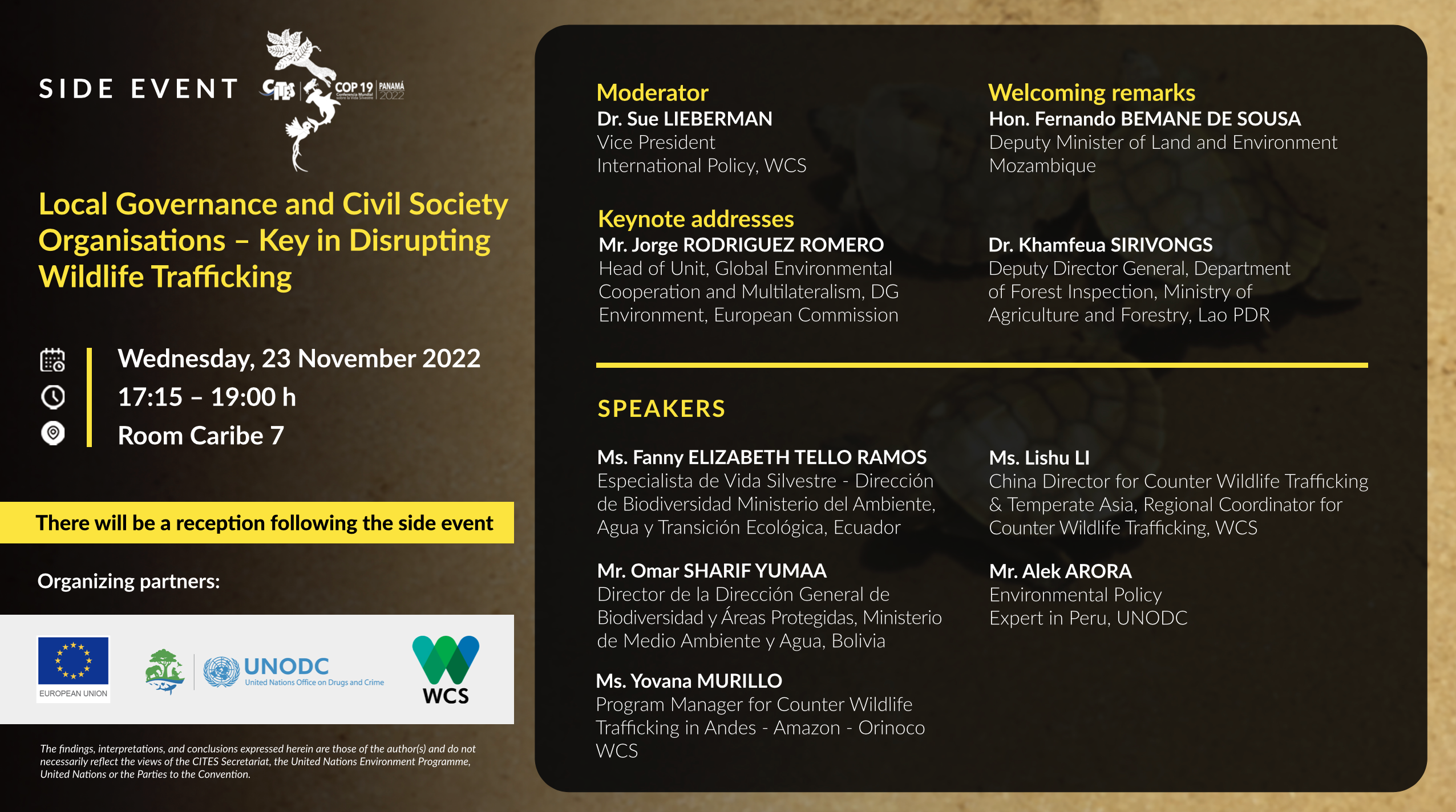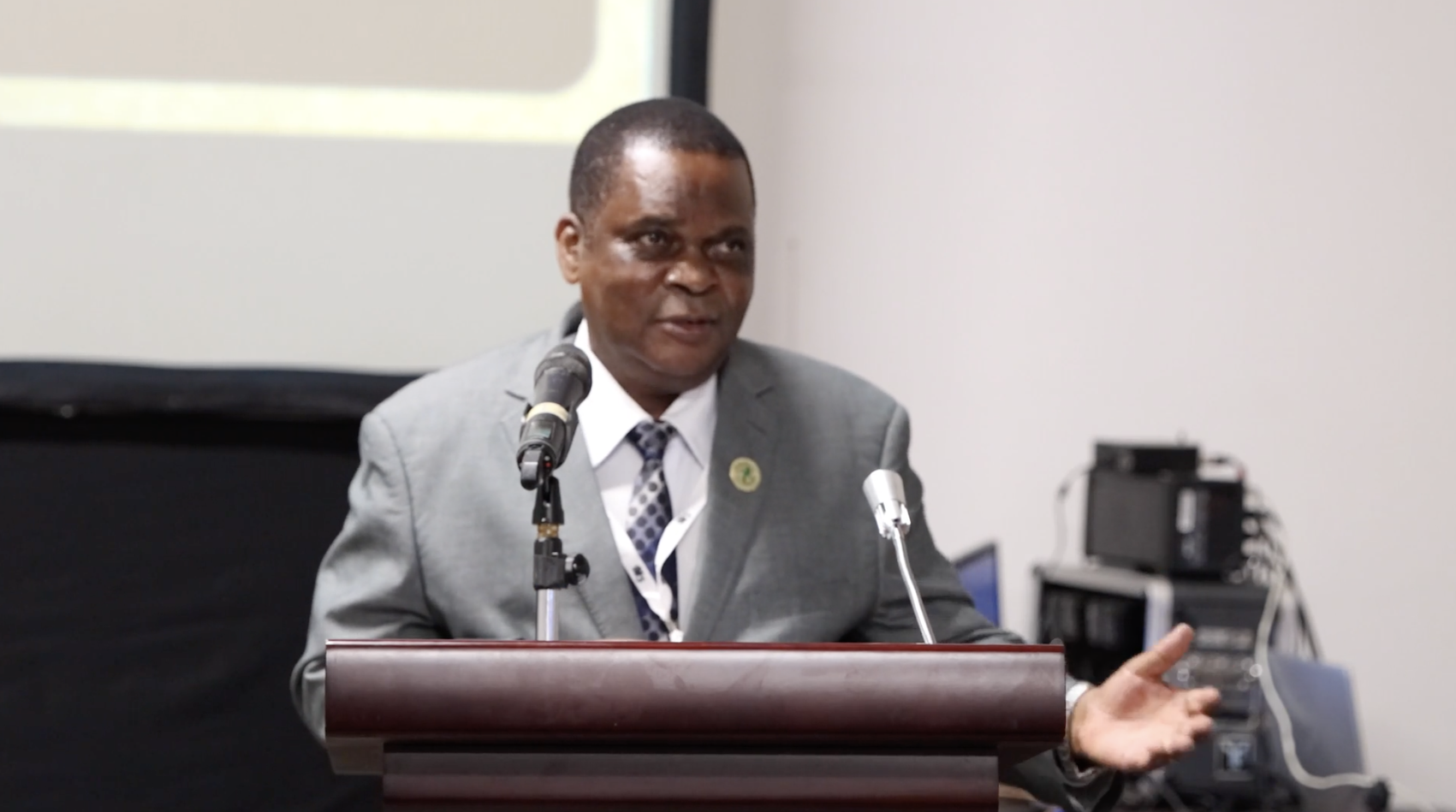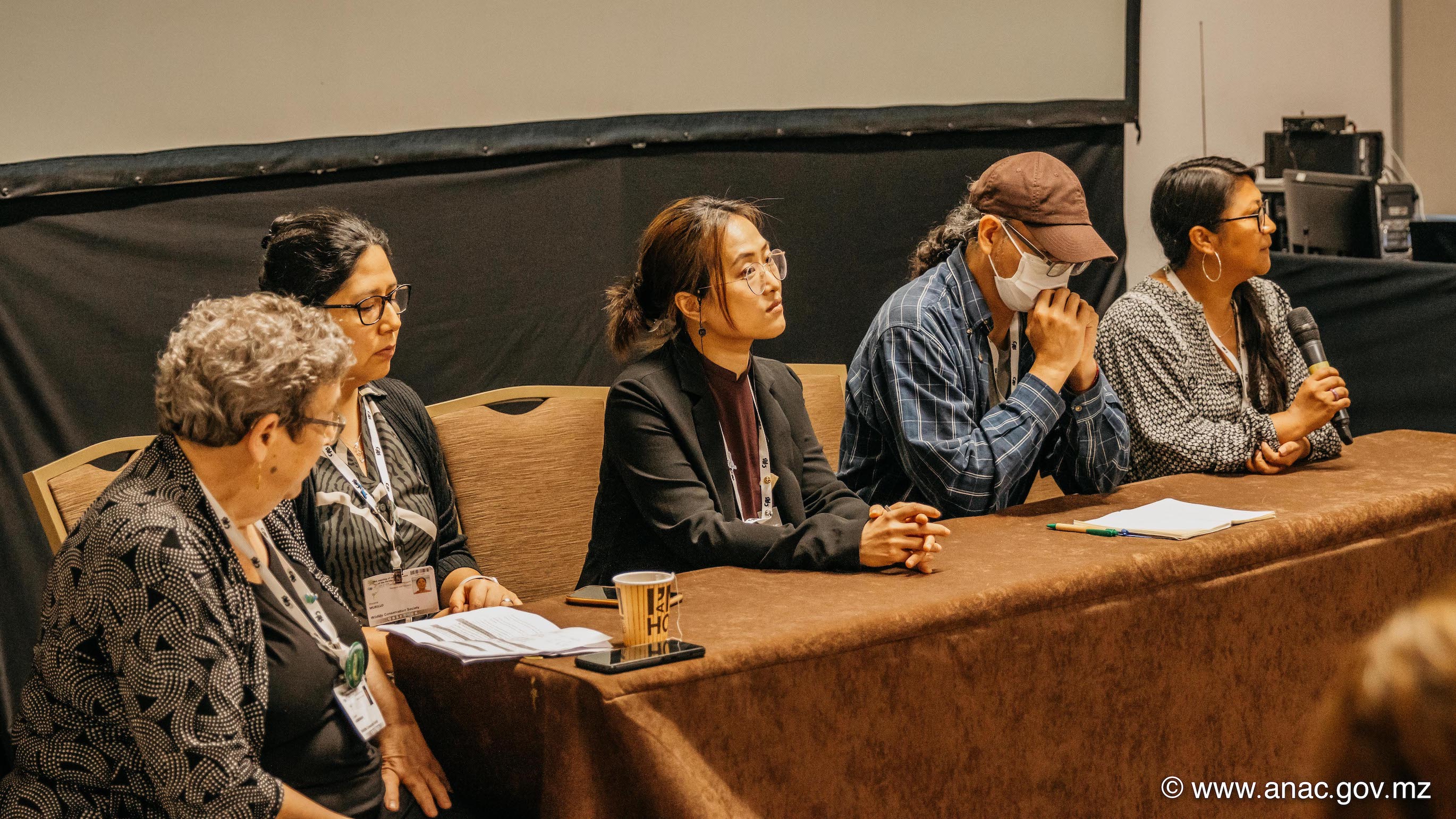
CITES COP19 - Side Event
The Wildlife Conservation Society (WCS), the European Union (EU), and United Nations Office on Drugs and Crime (UNODC) co-hosted a side event titled "Local Governance and Civil Society Organisations – Key in Disrupting Wildlife Trafficking" at the 19th Meeting of the Conference of the Parties to the Convention on International Trade in Endangered Species of Wild Fauna and Flora (CITES COP19) held in Panama City from 14th to 25th November 2022.
Wildlife trafficking is devastating populations of many species across the globe. A large number of species are now threatened primarily by poaching for international trade, due to multiple factors including international demand for live specimens, parts and products. Around the globe, wildlife is being bought and sold on an increasingly massive scale as pets, food, medicine, furs, feathers, skins, decorations, and trinkets. In addition to harming wildlife species, wildlife trafficking undermines the rule of law and local livelihoods and weakens impoverished rural and coastal economies further. If we are to achieve long-term successful results, wildlife trafficking needs to be addressed along the entire supply chain from source, to transit, to consumer countries.
The European Union (EU) is currently supporting several large-scale, regional on-the-ground initiatives in Africa, Asia, and Latin America aimed at tackling wildlife trafficking through leveraging civil society partnerships and increasing the effectiveness of local and governmental action, including by strengthening law enforcement capacities and the use of innovative technology. The Alliance for Wildlife and Forests is a regional action funded by the EU, aiming at enhancing civil society engagement to strengthen law enforcement and cooperation with and among authorities in Bolivia, Ecuador, Colombia, Peru, and the two tri-border areas with Brazil, to combat wildlife and timber trafficking. The Partners Against Wildlife Crime is an EU-funded action, aiming at disrupting illicit supply chains from source to market for tiger, Asian elephant, Siamese rosewood, and freshwater turtles in the Greater Mekong region, Malaysia, and China by leveraging civil society partnerships to increase the effectiveness of Government action. The EU also funded a project aiming at disrupting illicit supply chains of wildlife in Niassa Special Reserve, the largest conservation area in Mozambique.
The side event brought together actors from Africa, Asia, Latin America, and the EU, from governments and civil society, sharing local and regional experiences on strengthening the capacity of local authorities, civil society, and local communities in protecting their environment and wildlife, and in combatting illegal use and trade.




 High-level speakers and the audience at the CITES COP19 side event on tackling wildlife trafficking.
High-level speakers and the audience at the CITES COP19 side event on tackling wildlife trafficking.
The EU is currently supporting an initiative, which is led by WCS and in close partnership with the National Administration of Conservation Areas of Mozambique (ANAC), that aims to ensure a healthy, functioning and resilient ecosystem in the Niassa Special Reserve, the largest conservation area of Mozambique. The initiative’s goals are working with communities to improve livelihoods and increase support for conservation; enhancing conservation of wildlife such as elephants, lions, African wild dogs, pangolins and miombo woodlands; reducing threats to wildlife and other natural resources; and improving governance of natural resources in miombo woodlands.
Panelists representing Ecuador, Bolivia, WCS Andes - Amazon - Orinoco, WCS China, and UNODC Peru discussed how Indigenous Peoples and local communities can further be involved in actions to combat wildlife trafficking, the importance of evidence-based behavior change initiatives to effectively reduce demand in widlife and widlife products, and key opportunities for joint interventions with justice sector operators to address wildlife trafficking cases, among other issues.
 Panelists at the CITES COP19 side event on tackling wildlife trafficking.
Panelists at the CITES COP19 side event on tackling wildlife trafficking.
Programme & Speakers
Moderator: Dr. Sue LIEBERMAN, Vice President, International Policy, WCS
Welcoming remarks: Hon. Fernando BEMANE DE SOUSA, Vice-Minister of Land and Environment, Mozambique
Keynote addresses:
- Mr. Jorge RODRIGUEZ ROMERO, Head of Unit, Global Environmental Cooperation and Multilateralism, DG Environment, European Commission
- Dr. Khamfeua SIRIVONGS, Deputy Director General, Department of Forest Inspection, Ministry of Agriculture and Forestry, Lao PDR
Short video: Disrupting illicit supply chains of wildlife in Niassa Special Reserve, Mozambique
Panel:
- Ms. Fanny ELIZABETH TELLO RAMOS, Especialista de Vida Silvestre - Dirección de Biodiversidad Ministerio del Ambiente, Agua y Transición Ecológica, Ecuador
- Mr. Omar SHARIF YUMAA, Director de la Dirección General de Biodiversidad y Áreas Protegidas, Ministerio de Medio Ambiente y Agua, Bolivia
- Ms. Yovana MURILLO, Program Manager for Counter Wildlife Trafficking in Andes - Amazon - Orinoco, WCS
- Ms. Lishu LI, China Director for Counter Wildlife Trafficking & Temperate Asia Regional Coordinator for Counter Wildlife Trafficking, WCS
- Mr. Alek ARORA, Environmental Policy Expert in Peru, UNODC